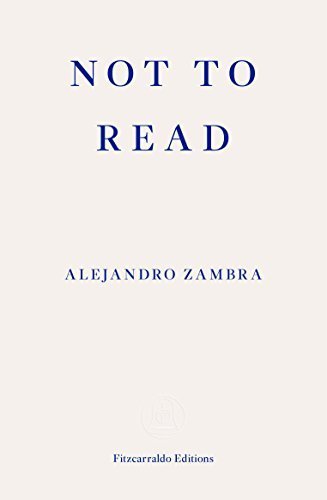What do you think?
Rate this book


In Not to Read, Alejandro Zambra outlines his own particular theory of reading that also offers a kind of blurry self-portrait, or literary autobiography. Whether writing about Natalia Ginzburg, typewriters and computers, Paul Léautaud, or how to be silent in German, his essays function as a laboratory for his novels, a testing ground for ideas, readings and style. Not to Read also presents an alternative pantheon of Latin American literature – Zambra would rather talk about Nicanor Parra than Pablo Neruda, Mario Levrero than Gabriel García Márquez. His voice is that of a trusted friend telling you about a book or an author he’s excited about, how he reads, and why he writes. A standard-bearer of his generation in Chile, with Not to Read Alejandro Zambra confirms he is one of the most engaging writers of our time.
‘When I read Zambra I feel like someone’s shooting fireworks inside my head. His prose is as compact as a grain of gunpowder, but its allusions and ramifications branch out and illuminate even the most remote corners of our minds.’
—
Valeria Luiselli, author of The Story of My Teeth
278 pages, Paperback
First published September 1, 2010
‘Madame Bovary sounded like porn; everything French sounded like porn to me. In that regard the movie was disappointing, but I watched it twice—I never again trusted movie versions, and ever since then I have thought that the cinema lies and literature doesn’t (I have no way of demonstrating this, of course). I read Flaubert’s novel much later—I tend to reread it every year, more or less when the first flu hits. There’s no mystery in changing tastes; these things happen in the life of any reader.’
‘Extremely intelligent children, I tell myself with certain indulgence, don’t read the books that adults make them read: they don’t want to be extremely intelligent, since wanting to be intelligent is extremely unintelligent. Intelligent children dominate to perfection the art of playing dumb, and thus they reach adulthood absolutely unscathed, perfectly free of the harsh punishments that intelligence tends to bring.’
‘My generation grew up believing that Chilean literature was brown, and that there was no such thing as Latin American literature. When, at the beginning of the nineties, we started seeing literature of exile and Latin American books and books by gringos and Europeans and Japanese, we read our own writers as if they were foreign and the foreigners as if they were our own. Yukio Mishima was our Severo Sarduy. César Vallejo was our Paul Celan. Macedonio Fernández was our Laurence Sterne. Raymond Carver was our Raymond Chandler. Álvaro Mutis was our grandpa. Robert Creeley was our mute friend. Marguerite Duras was our Delmira Agustini and Delmira Agustini our Edgar Allan Poe. Emily Dickinson was our first love. And Borges was our Borges—It’s no joke: a lot of Chilean writers thought it was a tragedy that Bolaño was Chilean. Maybe it bothered them that he didn’t renounce his nationality. I’m not exaggerating if I say that most Chileans don’t want to read Chileans, much less Latin Americans.’
‘Some years ago I wrote a pretty unfavourable review about Carla Guelfenbein’s first book, and in light of the current commentary about El Resto es Silencio [The Rest is Silence], her most recent novel, I was wrong back then. It’s too late to find out, I have to say, since no one is going to deprive me of the pleasure it gives me not to read certain books, and the truth is I wouldn’t read another novel by Carla Guelfenbein even if Coetzee himself recommended it to me.’
‘There are many Bolaño stories I like, and it would be hard for me to choose just one, but there’s no doubt when it comes to choosing the one I like the least. When I read ‘Buba’ the first time, I thought it was clear that Bolaño was not a football fan, and that impression stayed with me until I reread it an hour ago and discovered there was nothing in the story that would allow the inference that Bolaño was uninterested in football. The problem was, rather, that we his readers are too interested in the sport.
The problem with ‘Buba’ is a problem with reality: we find it ultimately unrealistic that a Chilean could ever have a record like that of Acevedo, who has gone to several consecutive World Cups. It’s painful to accept, but the truth is that if Acevedo were Argentine or Uruguayan, the story would seem irreproachable to us. Bolaño knew this and laughs affectionately at us as he bestows on us great, imaginary triumphs. We have one consolation, minor but perhaps useful in facing the game this afternoon: we wouldn’t believe the story, either, if Acevedo were Peruvian.’